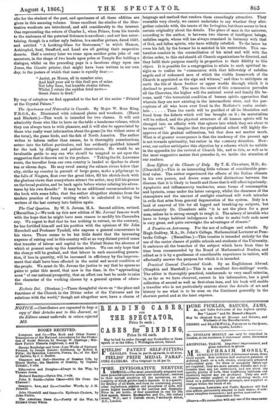Ecclesia Del. (Strahan.)—These thoughtful views on "the place and functions
of the Church in the Divine order of the Universe and its relations with the world," though not altogether new, have a charm of
language and method that renders them exceedingly attractive. They resemble very closely, we cannot undertake to say whether they alto- gether coincide with, the tenets of the Irvingites, but there seems to be a certain originality about the details. The place of man in the universe, according to the author, is between two classes of intelligent beings, unfallen angels, whose will has always remained in harmony with that of God, and fallen spirits, who have wilfully rebelled. To the latter he owes his fall, by the former he is assisted in his restoration. This res- toration consists in the reconciliation of his mind and will with the divine order, to this end should all Church organizations be directed, and they fulfil their purpose exactly in proportion to their fidelity to this object. It is possible for a congregation to attain to such spiritual in- sight as to realize its "communion with that fellowship of unfallen angels and of redeemed men of which the visible framework of the Church is appointed as the sign and witness," and thus to anticipate on earth the life of those further or upper worlds through which it is destined to proceed. The more the sense of this communion pervades all the Churches, the higher will the national social and family life be- come, until "the terrestrial condition of human spirits approaches that wherein they are now existing in the intermediate state, and the per- ceptions of all who have ever lived in the Mediator's realm assimi- late Then the earth will be purified of all its blemishes and freed from the defects which evil has brought on it ; its materialism will be refined, and the physical structure of all human spirits will be changed into an affinity with that sphere into which they are about to be removed." We imagine that the prophetical school will highly dis- approve of this gradual millennium, but that does not matter much. What is of greater consequence is that the tendency of the present age is not towards spirituality, but rather in the contrary direction. How- ever, our author anticipates this objection by a scheme which he unfolds in the appendix for the revival of Church life, and to this, as well as to the most suggestive matter that precedes it, wo invite the attention of our readers.






























 Previous page
Previous page